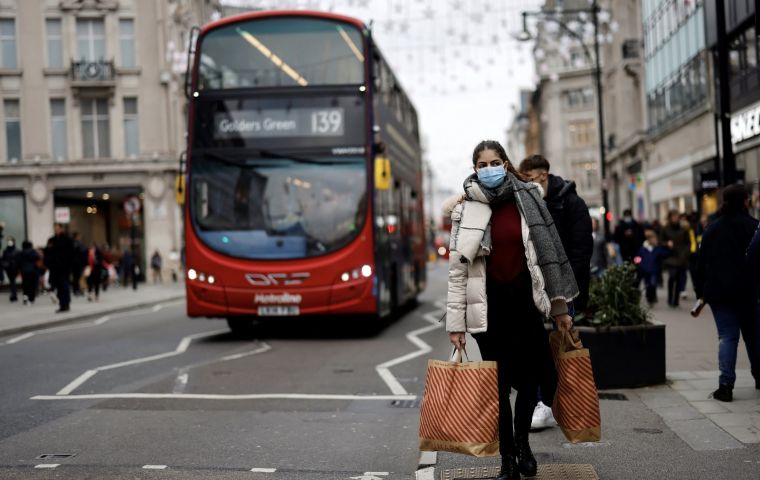MercoPress. South Atlantic News Agency
Fuel prices help tame, slightly, UK August inflation but food prices keep soaring
 “A fall in the price of motor fuels made the largest downward contribution to the change in both the CPIH and CPI annual inflation,” the ONS said.
“A fall in the price of motor fuels made the largest downward contribution to the change in both the CPIH and CPI annual inflation,” the ONS said. The United Kingdom consumer price index rose 9.9% annually in August, compared to 10,1% in July, according to estimates published on Wednesday by the Office for National Statistics, below a consensus forecast of 10.2%, but food prices continued to rise at its fastest pace since 2008.
Month-on-month, consumer prices rose 0.5%, fractionally below forecasts. Core inflation, which excludes volatile energy, food, alcohol and tobacco, was up 0.8% month-on-month and 6.3% year-on-year, in line with expectations.
“A fall in the price of motor fuels made the largest downward contribution to the change in both the CPIH and CPI annual inflation rates between July and August 2022,” the ONS said in its report.
“Rising food prices made the largest, partially offsetting, upward contribution to the change in the rates.” Food prices rose over the month of August, by the highest rate since 1995, driven by basics such as milk, cheese and eggs.
U.K. has been hit by a historic cost-of-living spike this year as food and energy prices skyrocket and pay increases fail to keep pace with inflation, which has led to one of the sharpest falls in real wages on record, and a rash of industrial strikes.
Last week new Prime Minister Liz Truss announced an emergency fiscal package capping annual household energy bills at £2,500 for the next two years, with an equivalent guarantee for businesses over the next six months and further support in the pipeline for vulnerable sectors.
Analysts expect the measures — estimated to cost the public purse around £130 billion — to sharply reduce the inflation outlook in the short term, but anticipate increase over the medium term.
The Bank of England is set to announce its latest monetary policy decision next Thursday (September 22), after a delay due to the death of Queen Elizabeth, and is widely expected to opt for a sharp 75 basis point increase to interest rates as it looks to drag down inflation.
At its last meeting, the Bank projected that inflation would peak at 13.3% before the end of the year, and policymakers will be reappraising their outlook in light of Truss’s new energy cap announcement.




Top Comments
Disclaimer & comment rulesCommenting for this story is now closed.
If you have a Facebook account, become a fan and comment on our Facebook Page!